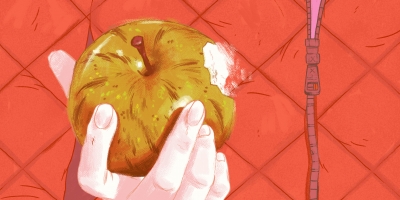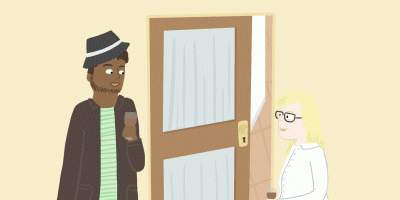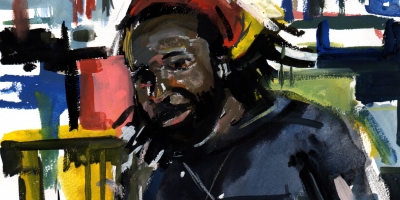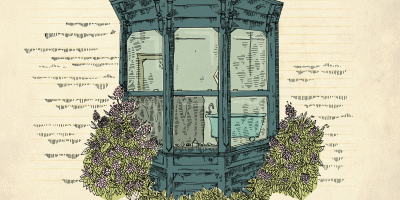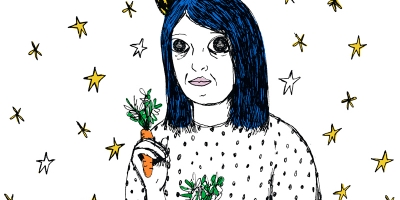Fiction
Come Make Love With Us
by Cari Luna

Across SW Third Avenue, the porn house gleams red and green, its lights reflecting like an oil spill in the rain-slick street. The marquee: COME MAKE LOVE WITH US. Joseph jams his hands deeper in his pockets, jiggles his keys against his thigh. Mark is late.
No stars to be seen from here. Too many clouds, too much light coming up off the city. Back home in Tillamook, the stars would spill out and weigh the sky down. “Aren’t they like diamonds? Aren’t they something?” his mother used to say, one thin finger raised, his little-boy eyes skimming along her arm to the sky balanced on her fingertip. They would walk the two blocks from their house to the water on summer nights, just the two of them. The ocean would disappear into a vast black empty, and the night sky would hang down so low it seemed you could reach a hand up and trail your fingers through the yellow-white milk of the stars overhead.
Here in the city, the stars are remote. If you could touch them, they’d clink like tin cans. Night sky like a dirty blanket, the stars just moth-eaten holes.
A couple approaches the theater, laughing, smiling. The guy is in his forties, maybe, the woman about the same. Both of them thick around the middle. She’s wearing high-heeled red boots. He’s wearing a suit jacket. He opens the door, ushers her in, and it falls closed behind them. These are the people Joseph will see inside, if Mark shows up.
It was Mark who found out what goes on in the porn theater on the weekends. “Everywhere you look, I hear, there’s people screwing,” Mark had said. “Guys line up to fuck some chick and her husband’s across the room fucking some other chick.”
“You want to line up to fuck someone else’s wife?” Joseph had said. “You want to be number fifteen out of fifty in there?”
“Don’t tell me you’re not curious. It’s right here in Portland. Right there in Old Town. We’ve got to go.”
But it won’t just be seeing for themselves. Can you stand there and watch? You’d have to jump in, right? You’d have to play along. He thinks about stripping down in public like that. He thinks about fucking some stranger while other strangers watch, lined up behind him, waiting their turn. Maybe he can just drop his pants; maybe that’s enough. Maybe he can wait in line fully dressed, his cap and coat still on, even. And then drop his pants real quick when his turn comes. Stick it in. Pretend there’s no one looking. Get it over with. And then he will have done it, and Mark won’t be able to say he didn’t have the balls for it, and he can go home.
Or maybe Mark won’t show. Maybe Mark is just as chickenshit as he is. Maybe Mark will show, and Joseph can cop to being chickenshit, and they can have a laugh about it and go get a beer instead.
Four years alone in Portland. He’s got to put himself out there sometime, got to take a chance.
He closes his eyes. The gritty hum of car tires on wet asphalt. Heels on pavement. Car doors opening and closing. Friday night voices calling across the street. He tries to find a song in his head, tries to feel like maybe this might be okay. It’s sex. Just sex. And no strings. No names. It’ll be okay. No one is going to be thinking about him. They’ll be thinking about themselves. They’ll be thinking about what brought them there. Maybe some of them will be as scared as he is.
He smells the fear rising up from his body, sharp and animal, mixing with the wet wool from his coat. They’ll smell the fear coming off of him, the women in there. They’ll know.
A bright blur crosses his line of sight, resolving into a woman in an orange coat when he raises his eyes. A small woman in an orange coat, dark hair cut close to her head like a man’s. A red scarf gathered around her neck, hands in pockets. She’s alone. She looks nervous. She might be going to the theater. He could do it, if it was her. She meets his eyes and smiles. If he could talk to her, connect with her, they could go inside together. They could find a corner, do what’s done in there, together. Leave together. And that would be okay. Look at how she smiles at him. Look at that sweet face tilted toward him. Not a stranger. Something else. He could do it, if it was her.
He smiles back at her, but something like panic crosses her face and her smile drops away. She throws a glance back over her shoulder to a man walking behind her, talking on a cell phone. She drops back to let the man catch up with her. As she passes Joseph she looks up at him again. A stolen look; a small, secret smile. She tucks a hand through the man’s arm as they cross Burnside and head toward the bridge. She’s an orange glow, receding into the dark. It takes forever for them to disappear from view.
“Hey, man. Sorry I’m late.” Mark locks his bike up beside Joseph’s. Calm, efficient hands on the lock and key. A loose smile on his face. “You ready for this?”
Just get through this. It’ll be fine. Fine. “Yeah,” Joseph says.
They pay five bucks each to pass through the heavy outer door of the theater and into the dim lobby, where men whisper into cell phones and eye the women who toy with the zippers on their coats and teeter on nervous heels. The faces are unremarkable. The bodies are unremarkable. Mark dips his hand into a bowl of condoms by the door. He hands a fistful off to Joseph, crams another fistful into his own pocket, winks. It must be so easy to be Mark.
They push through the scarred leather double doors into the theater; inside it smells of cunt and mildew. The light is dim, the music loud. Porn flickers on the big screen at the front of the room, but no one seems to be watching it. Through the crowd, Joseph catches flashes of pumping asses and lifted legs. Men shuffle from dark corner to dark corner, looking past each other. Every time the double doors creak open, heads raise and swivel to survey the new arrivals. Many more men than women. The women do not look like the movies would have you believe. Neither do the men. You could pass any of these people on the street without looking twice.
Just in front of Joseph, there’s a woman bent over the back of a worn velvet theater seat. A blonde, maybe late thirties. A short, bald man with blue satin pajama pants around his ankles has his hands on her hips, pumping into her. He either doesn’t notice or doesn’t mind that she’s talking to another guy sitting in the seat next to the one she’s bent over. “A thousand bucks they wanted to fix it,” she’s saying. “The damn electrical system.” And the guy she’s talking to is nodding, saying, “Yeah. That’s where they’ll get you.”
Across the room, a chubby young redhead sits on the floor against the wall, blubbering, arms wrapped tight around her knees. There’s a young guy next to her rubbing her arm, whispering to her, but his eyes dart around the room, taking in all he’s missing.
The blonde with car trouble catches Joseph’s eye. She nods toward the crying woman. “You can lead your girl to the theater, but you can’t make her swing.” She cackles and the short bald man comes with a grunt. Another man takes his place and she doesn’t even glance back to see who it is. “You getting in line?” she says to Joseph. The guy in the seat in front of her is fondling her tits. They’re heavy and loose, veined and stretch-marked. She’s got lipstick caked at the corners of her mouth.
Mark hasn’t wasted any time. Joseph spots him over by the movie screen, next in line for a tall brunette wearing devil’s horns and a white apron.
“No, ma’am.”
She laughs. “Maybe later.”
Joseph nods and backs away. He feels hands on his arm, then at his crotch, tugging his zipper down. A woman in her late forties, maybe. Could have been the librarian back in Tillamook. Could be a librarian here in Portland. “First time?” she says. He nods, leaning back into the wall. Her hand eases into his pants and he closes his eyes, thinks about the woman in the orange coat. He thinks of her looking up at him with blue eyes. Or maybe they were green.
After the librarian, who turned out to be a second-grade teacher, there was the big-hipped brunette with the bad tattoos. After the big-hipped brunette, there was the blubbering redhead, who was trying again to be a good sport. The redhead ended up burrowing into Joseph’s chest hair and crying, dripping snot all over him, and after that he’d signaled to Mark that he’d had enough. They left the theater and went and got good and drunk at Mary’s. Joseph drank beer after beer and barely noticed the dancers. More legs, more tits, more ass. So what. He could feel that poor redhead’s snot where it had dried, pulling his skin tight, like an accusation.
And now here it is, a bleary-eyed Saturday morning. Hungover and raw and folded closed, and he’s barely tied his apron and strapped on his knife before the guys are on him, Tim and Cooper circling around. Mark got them all wound up good before Joseph even clocked in. “Heard about last night,” Tim says. “Mark says you guys bagged like five chicks each. Says they were lining up for you.” Hungry grin of the long-married man.
“Yeah, well…” Joseph stoops to pick up a box of potatoes and load it onto his utility cart.
“You should have seen him,” Mark says. “He got this one little redhead—what was she, like nineteen? Twenty? A kid. And Joe’s givin’ it to her, and she starts crying. Her boyfriend’s there watching with his dick in his hand and Joe’s banging away at the chick, got her up against the wall, and she’s bawling, hanging on to him and crying like she’s never had it so good in her life, you know?” He rubs his chest. “Yeah, you guys should come next time. Wild. Am I right?”
“Yeah,” Joseph says. “It was wild.”
“She was really crying, huh?” Cooper says.
“Yeah. Yeah, she was,” Joseph says.
“And that’s a good thing?” Tim says.
Joseph loads another box onto the cart. “No. It wasn’t.”
Mark looks up sharply, but he doesn’t say anything. Joseph shoves the cart against the warehouse doors, nosing it out into the store. She was just a kid, that redhead, young and stupid enough to let her boyfriend drag her where she didn’t want to be. Joseph isn’t a kid. He should have left her alone. That frantic look on her face, the way she kept tugging at her too-tight, too-short dress, trying to make it cover her. She’d said, “You seem like a nice person.” She’d said, “It’s okay, really.” And then Joseph, nice guy that he is, picked her up and pinned her to the wall and fucked her so hard he shook her like a goddamn rag doll.
She was no more scared than he was, and he hated her for that. He’d tried to fuck all his fear, all his weakness into her. Out of him, into her. He’d left her crying on the floor, her boyfriend rushing to her side and looking up at Joseph all confused, himself no more than a kid. Well, maybe the kid won’t bring her back again. Maybe he’ll think twice before dragging his girl out to get nailed by strangers again. Or better, maybe she’ll leave him, find someone nicer than that guy, someone nicer than Joseph.
Goddammit.
Break time, and he walks to the front of the store, trying to catch Maura’s eye, going through her line to pay for his lunch. Maura with her pinup-girl tattoos and her complicated eye makeup and her hair falling over her shoulders in red and blond stripes. Maura who baked him cookies when she heard that his dad died, and he’d held that kindness close and hoped it was the beginning of more kindness, the beginning of her opening to him, but she never did.
She gives him the same thin smile she gives the customers. As he’s walking away, she says, “I heard what you did last night. Is it true?”
“Depends on what you heard.”
“Mark said you got kind of rough with this one girl.” She looks at him with a funny tilt to her head and she doesn’t smile again, not even the thin smile.
He takes his sandwich outside and eats it hunkered down at the side of the building by the dumpster, the smell of rotting apples and sulfurous cabbage leaves. He’s gotten it all wrong again. He always gets it wrong.
Stacking apples in the display. Galas. Steady, mindless work. Dip into the box. Cool firm apple in hand. Set fruit down, just so. Reach into the box for another. Another. Another. The clean, sweet scent of apples. Grocery carts gliding past him like metal sharks. Smiling at customers but not really seeing them, as they don’t really see him.
It’s good work. Honest. And you can be hungover and still do it well. You can be distracted, totally sunk into your thoughts, and still do it well. Joseph does it well. He’s steady, reliable. He cares about stacking the fruit and vegetables neatly, cares about stacking them in such a way that it doesn’t all come crashing down if someone pulls an apple or a pear or an orange from the center of the stack. There’s been talk about Joseph getting the nod for the next open Assistant Produce Manager slot. He’s not sure he wants this. It would mean more money, but it would also mean an end to the quiet stacking of fruit. An end to the mindless soothing motion of hand from box to stack to box.
Customers come and go. Hands pluck apples from the stack, holes in the pattern he’s building. He plugs the holes with new apples, then new hands reach in, new holes; it never ends.
“Excuse me.” A soft voice, pale thin hand moving toward the stack. The hand is followed by an orange sleeve, the sleeve riding up to expose a slim, veined wrist. Dark cap of hair on the small head, then the head swivels and she smiles up at him. It’s her. She blushes, drops two apples into her cart, and wheels away. She passes the kale, the carrots, the beets. She pushes the cart quickly, shoulders tense like she knows he’s watching her. She reaches the dairy case and disappears from sight.
He should have said something. He should have said hello, or at least smiled back. He can’t be sure he even smiled at her, surprised as he’d been to see her suddenly there, reaching for the apples.
That sweet smile, those small hands. The bright orange coat and the red scarf bunched at her throat. How could he have thought she was going into that theater?
The last Gala in the box. He places it on the stack and wheels his cart toward the warehouse door. Pears next. She’s somewhere in the store, still. Her shopping cart was empty; she’d come to Produce first. He could take a quick walk through, maybe find her in the bulk aisle, or by the cereals. He could take her aside and say… Say what, exactly?
His hangover pecks at him, steady drumming at his temples and his gut. He’s half tempted to go into the boss’s office, say he’s sick. Take off the rest of today and tomorrow, too, hop a bus back home to Tillamook. Crawl into his old bed. Let his mom sit on the edge of the bed and stroke his cheek, humming under her breath all the songs she used to sing to get him to sleep as a kid. Let her lull it all right out of him. The redhead, the loneliness, the rain. He would tell her he’d seen a woman, a beautiful woman in a bright orange coat, and that she had smiled at him.
But there are pears to be stacked, and then zucchini. Then bottles of fresh-squeezed orange juice to be counted. Then potatoes, then onions. Then scallions, and then apples again. Then his bike and the streetlights and the rain. And his apartment empty and quiet; his bed small and cold, pushed up beneath the window and the two stars that get caught in the corner of the window frame when the night is clear.
Monday morning, quarter to eleven, and he’s riding toward the store for his shift and there she is. As he coasts down the hill coming off Stark, she’s there on Twentieth Avenue, on the sidewalk. Orange coat, dark hair, walking toward him. She’s pushing a stroller, a child in it, blue coat, jeans, sneakers. A boy, then. Maybe two, three years old? What does Joseph know about kids? She has a child.
He slows as he goes past her, and she looks up, blushes to see him. He smiles as big as he can, then rides on past. When he looks back over his shoulder, careful to still be smiling, he sees her standing there, looking after him. She manages a nervous smile and a little wave, and he speeds away. His hands are still shaking two miles later when he locks his bike up outside the store.
Joseph sits on the edge of his bed, the phone pressed to his ear ringing once, twice, another ring and his mother’s voice on the outgoing message. She’s not home so much these days. Right after Dad died, she would always be home, always by the phone. But two years on now, and she’s taken up tai chi at the community center; she’s joined a book club. He called her cell phone one night and there was a man’s voice in the background. Since then, he only calls her home number.
“Hey, Mom. It’s me.” After nine on a Monday night. Maybe she’s at her book club. Maybe she had a headache and went to sleep early. Maybe his voice is playing out into the kitchen and she hears the sound of it from her bed, though not the words, and she smiles in her sleep, to think of him, the sound of her boy’s voice downstairs. “I’m just calling to…I don’t know. I’m just checking in, is all. Okay. So I’ll talk to you tomorrow, maybe. Love you.”
He thumbs the phone off, sets it on the windowsill. Those same sad stars stuck in the corner, the same elm shaking its branches against the tired sky.
Somewhere nearby, close enough that she had been walking with a child in a stroller, is the woman with the orange coat. The boy is surely asleep by now, and maybe she’s washing the dishes or watching TV with her husband. But maybe she’s alone. Maybe she’s gone to an empty room in a distant corner of a too-big house, a house she feels lost in sometimes. And maybe she’s looking out a window, pressed against the cold glass, and she’s seeing the same two sad stars, and thinking about Joseph. Thinking about the angle his body made over his bicycle as he rode away. Thinking about his hands as they stacked the apples. If he knew where she lived, if he could find that big lonely house, he would go to her now. He would stand beneath that window. He would let her know that he saw her, that she wasn’t alone.
Thursday evening. Three days since he saw her on his ride to work. Five days since she came into the store. For five days, he avoided tasks that would keep him off the selling floor; he cut his breaks short. Still, she didn’t come.
He rides his bike fast down Stark, headed for the bar where he said he would meet Mark and the guys. Maura’s supposed to be there, too. Maura and a couple other girls who work the front end.
The woman in the orange coat is a ghost, a phantom, an empty hope. She’s a customer who comes in to buy apples. She’s a woman who walks with her husband across the Burnside Bridge on a Friday night. His mother wouldn’t approve of it, the chasing of a married woman. His mother might even be ashamed.
Maura, she’s real; she’s solid. He let his hand graze the back of her neck once in the break room and his palm came away smelling of sweat and ginger.
But here, now, a red light at SE Twelfth Avenue, and he pulls his bike up alongside a red minivan, and it’s the woman in the orange coat, leaning her head against the passenger window. She looks out and sees him. She presses her hand to the glass like she’s trapped, like she’s begging him to help her escape. And then the light changes and the minivan moves on.
It can’t be coincidence, how often they’ve found each other in the past week when he can’t recall ever having seen her before. It’s something bigger than coincidence, something that hums like a deep current in his bones. There was that first moment between them on Burnside, that sense of recognition, of relief at having found each other. Just a moment, but still. And then the quiver in her voice as she reached for the apples on Saturday, the tension in that small body as she walked away from him. There was her wave as he rode his bike away from her on Monday, hesitant, hopeful. And now…just now… This isn’t something he’s conjured up, a ghost to feed the loneliness.
There is the husband, there is the child. But that doesn’t mean she isn’t for Joseph. Isn’t that what she’s saying to herself as she places the apples in her cart, as she stops to watch him ride away? “You,” she’s saying. “I am for you.”
That small, sleek head. The narrow wrist, its blue veins. Her eyes on his as the minivan pulled away, wanting escape, wanting out.
He walks into the bar as if she lay draped across his back. Mark is at the bar with a beer and a shot glass, talking too loud, his arm around Maura’s shoulders and Maura leaning into him and laughing, and who cares? Cooper and his girl are there, and Tim and his surly wife, and two of the new checkout girls whose names he can’t remember, and who cares?
There’s a woman out there in a minivan with her husband who wants to be here with Joseph instead. Or not here, but somewhere else. With Joseph. Is she imagining following him home to his apartment? Imagining what it would feel like to slip into the sheets of an unfamiliar bed, to feel his body moving over hers? She would be so small beneath him. She would smell of apples. She would sigh his name.
Mark looks at Joseph and nips at Maura’s earlobe. She stiffens, glancing at Joseph. So she knows. But it’s okay, it’s okay. He’s let her go. Maura whose neck smells of sweat and ginger. He leans into the bar. He orders a beer, then another. And then he leaves, drifting out the door to where he left his bike. But his bike isn’t there, just the chain of his cheap lock left dangling. There’s a moment of vertigo, panic rising. He scans the other bikes locked up in front of the bar and none of them are his. There’s Mark’s bike, untouched. But okay. So this is how it goes. How it’s going for Joseph, anyway. He’ll walk home. Okay.
He’ll see the woman in the orange coat tomorrow, and they’ll speak, and it will be the beginning of something. He knows that now. It was what she promised him, that palm pressed against the glass.
No dawn this morning, just progressively lighter shades of gray. A heavy rain falls as Joseph walks to work, soaking the front of his legs, seeping into his shoes. He tries to grab on to the certainty he felt last night, the promise he thought she’d made. In the flat gray light of morning, it barely seems possible. He’s misunderstood; he’s gotten it all wrong again.
A red minivan pulls up beside him, and the passenger window rolls down. It’s her. She’s looking out at him from the driver side, the engine running. “Do you want a ride?” Her voice is high and hesitant, her hands tight on the steering wheel. “It’s pouring.”
He laughs, he doesn’t know why, but he laughs. “It is.” The door handle is cold and wet under his fingers. He opens the door, climbs in. There are toys at his feet. Empty coffee cups. He glances in the back and sees not one but two child seats in the middle row. “Thanks.”
She smiles, a small smile, her lips pressed together, and pulls away from the curb. “Are you headed to the store?”
“I am.”
They fall quiet, the short trip to be over all too soon. Just five minutes and they’ll be there.
“You’re walking today.”
“Somebody stole my bike last night.”
“That’s terrible.”
He shrugs. He doesn’t want to talk about his bike. Four minutes left together, maybe three. “I’m Joseph,” he says. Because it’s a start. It’s something.
“Emily,” she says. And he wouldn’t have thought she would be an Emily, but he sees now that it suits her.
“Emily.”
Then silence again. Because they are strangers, after all. She’s more distant, less known to him now when she’s here beside him than she’s been through all the nights since he saw her on Burnside. She’s smaller than he remembered her, but her nose is slightly larger, her lips slightly thinner. She chews on her lower lip as she drives. She drums her nails on the steering wheel when they stop at a light.
She’s wearing a denim skirt, showing off thin, strong legs in black tights. She’s got the orange coat unbuttoned, a white t-shirt beneath it, the swell of her breasts just barely hidden by the V-neck. She lifts her foot from the brake and her skirt shifts, revealing a slip of thigh. Those tights don’t go all the way up.
“I’m really early for work,” he says. “I was going to be early anyway, walking. Now I’ve got like a half hour to kill.”
She pulls into the store parking lot, choosing a spot way in the back corner, no other cars around them. “Maybe we could hang out a little bit before your shift.” She says this to the steering wheel, her head bowed. She glances at him, then climbs between the two front seats, past the middle row and the child seats, to the back row. She sits down, pats the bench seat beside her. “Tinted windows.”
He wonders if she’s done this before, but no. She’s blushing, she’s fidgeting with her skirt hem. It’s Joseph she wants. He rushes to the back, grazing his eyebrow on the dome light. He’s okay, though. He’s okay. He falls to his knees before her. He parts her thighs.
Her head drops back against the seat, her mouth falls open. The rain gives over to hail beating patterns against the minivan roof. She is the loose skin of her neck, she is the creases at the corners of her eyes. She is the slightly sour breath, she is the flesh that smells of milk. She tugs on his hair. “Come on up here,” she says.
He perches on the seat beside her, nervous, unsure of where to put his hands, unsure of how she wants him to be. She moves to hover over him, pushes him back against the seat, lowers herself onto him. Her eyes squeezed shut, he could be anyone. She clings to his shoulders and rides him hard. She’s done this before. He could be anyone. She rides her idea of him, what she needs him to be. She’s slipping away from him. Emily. Not the woman in the orange coat. Emily.
Even so, she is small and warm; the sweet weight of her, the hot grip of her. She is here and he is here, and the hail and the rain. She cries out, something low and ugly and wordless. He will let it be his name.
